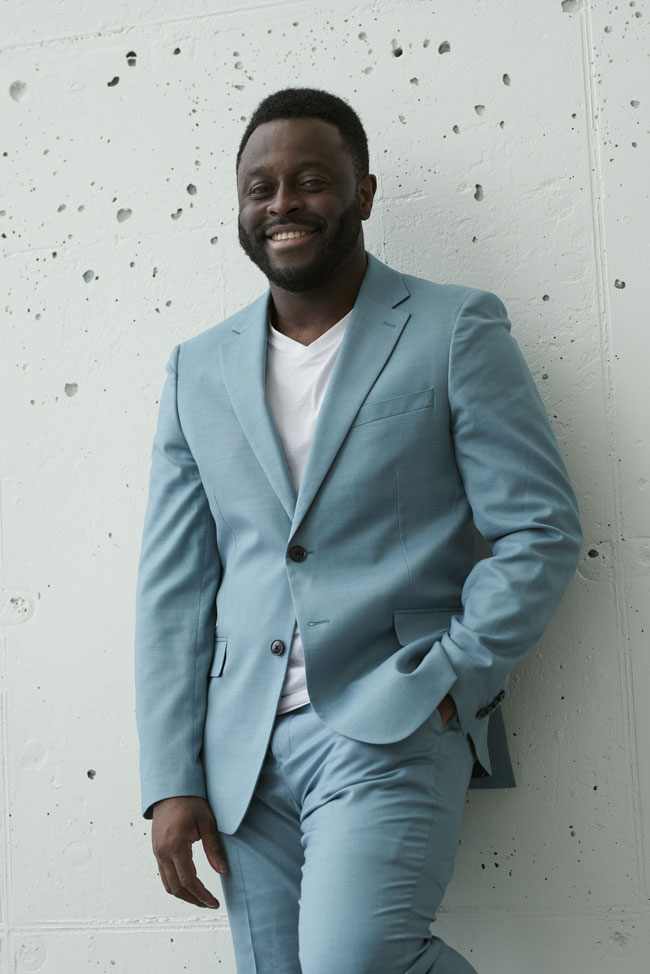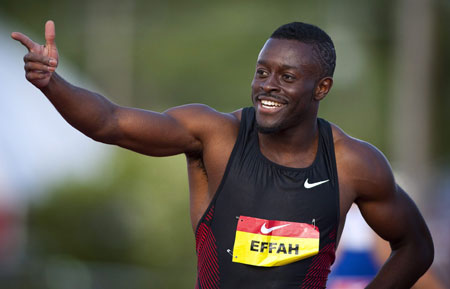The speed of Sam

Sam Effah, MMIE’21, knows what life in the fast lane is like. Really. The sprinter from Calgary was Canada’s fastest man not once, but twice, winning the Canadian 100- metre championships in 2010 and 2011. In university, he broke the all-time U Sports record in the 60-metre sprint. In that race, in 2010, Effah ran what is essentially two-thirds of the length of an NFL football field in an astonishing 6.57 seconds. His record remains unbeaten.
Effah excelled in his sprint career. Twice he represented Canada at the Commonwealth Games and three times at the World Championships. He won seven gold medals in university competitions and four times was a U Sports Athlete of the Year.
Off the track, Effah is an accomplished keynote speaker and has volunteered in support of youth-focused initiatives such as Right to Play and Classroom Champions. In 2019, he and hurdler Sarah Wells, MMIE’23, competed together on season 7 of The Amazing Race Canada. They finished second. And in 2022, he served as Team Canada’s co-Chef de Mission at the Commonwealth Games.
Now, as a brand manager at RBC in Calgary, Effah is helping Canada’s future elite athletes through RBC’s Training Ground program. In conversation with Smith Magazine managing editor Robert Gerlsbeck, Effah talks about his career on the track, a near career-ending injury (one of several that kept him from the Olympics), life after sports, and that time he put it all on the line for a sponsorship deal with Nike.
How did your track career start?
I didn’t do a lot of sports in high school. I played some football, and, in Grade 10, I joined the track team and went to provincials in Alberta. I did it for fun and to get a day off school. At provincials, a lot of kids around me were very competitive. They were decked out in the right gear and had been running for a long time. I was just a kid in baggy shorts who, as it turned out, was kind of fast.
When I got to the University of Calgary, I joined the track team and fell in love with the sport. When I found out that athletes could receive athletic scholarships if you were fast enough — I was sold. It started as a way to help pay off student loans and turned into a passion that almost got me to the Olympics. In that first year, I won a national medal in relay with my university team. In my second year, I made the world championships. And in my third year, I broke the Canadian university record in the 60-metre sprint — which still stands. So it was a very fast ascension, but once I got the opportunity, I just ran with it, no pun intended.
What exactly hooked you on sprinting?
I grew up with three older brothers and a younger sister, and I always wanted to be faster than them. But later, what I loved most was having my own time on the track, getting into my own head. It was an opportunity to just be myself. I wanted to see how far I could push my body and see how fast I could go. And when it came to competition, there was something about being on the starting line — and it’s just you. You’ve gotten everything you can out of the training. You can have a great start and run fast. And if you don’t, you can’t blame anyone but yourself. Knowing that my fate was in my own hands was something I absolutely thrived on.
What lessons from your family stayed with you as an athlete?
I had very supportive parents and family growing up. My mom and dad are from Ghana, and they came to Canada. I was born in Calgary and that’s where I grew up. My parents instilled discipline in me and in my older brothers and younger sister. But I think the number one thing they gave us was this idea that you can never dream too big. So what that means is, they came from another country to give me a better life. They gave me this opportunity and said, Hey, the sky’s the limit. Nobody can tell you that you can’t do anything. You just have to go do it.
When you look back at your career, what were the biggest highs?
There are lots of highlights but one that was extra-special for me was my second 100-metre national championship, in 2011. It was in my hometown of Calgary, and it happened to be on the very first track I ever ran on. I remember stepping on that track when I was in middle school for our sports day, you know, I was just a little kid. And I dreamt of being a superstar athlete. I never would have imagined the same track — Foothills Athletic Park — would one day host Canada’s fastest athletes.

Sam Effah celebrating victory in the men’s 100-metre race at the Canadian Track and Field Championships in Calgary, in 2011
So, fast-forward to 2011, to have my friends, my family, my university behind me, as I crossed the line first. It was just one of these moments where it didn’t have to be at the Olympics or the World Championships. To be able to accomplish that feat where it legitimately all started for me was the most powerful, amazing feeling.
And what were your toughest moments?
There are two. One was during the pandemic, in late 2020, and trying and believing I would make the Olympics. I didn’t have access to training facilities, so I had to train in an underground parking garage for months. It was at the underground grad parking lot at the University of Toronto, so even though it was in the thick of winter, it was quite warm. Training in a parking garage, continually pushing yourself day after day, month after month, and not knowing if your Olympic dream was going to come true, was tough. That experience forced me to dig deeper than I ever had before.
The other tough point was in 2014 when I got injured. I had a labral tear in both my hips [the labrum is cartilage that lines the hip socket]. It was very painful. It’s like having two broken hips. To sit hurts, to stand hurts, to cough hurts. I was told I may never run again at the same pace, which was devastating. Looking back though, it was a blessing in disguise because it forced me to think about what might come next. Since university, sprinting was all I knew. My whole focus was the podium — period. If I wasn’t an athlete, then what?
You did have surgery and competed at the 2018 Commonwealth Games. But how did that injury change your outlook?
It forced me to figure out what I could do after my career as an athlete ended. I had a business degree but no real work experience. I remember going to my computer and googling “jobs for athletes with no work experience”. Fortunately, I came across the RBC Olympians program and was able to start working part time. Part of the job was in the office and part of it was going out to do public speaking. I wasn’t a public speaker, but I decided to make myself one because when you need to make it work, you find a way. And today I do keynotes in front of hundreds of people. Eventually, thanks to Game Plan [of which Smith is a founding partner], I decided to get my master’s degree, which led me to the Master of Management Innovation & Entrepreneurship program at Smith. For me, this was a way that I could ensure that I’d be ready for whatever else life threw at me post-sport.
Tell me about your job now as a brand manager at RBC.
In 2022 I jumped into a full-time manager position on the brand marketing team at RBC, where I help find and fund Canada’s future Olympians via RBC Training Ground and support RBC’s broader sports marketing initiatives, including each Olympic Games campaign.
With RBC Training Ground, we’re committed to finding and funding the next generation of Olympians. This program tests athletes aged 14 to 25 on their speed, strength, power and endurance to see if they’ve got what it takes to make Team Canada. With the RBC Olympians program, in addition to financial support, RBC provides opportunities for personal brand exposure, professional skills development and, for select athletes, valuable career experience they can attain while training in a flexible work environment. I came through this program and, in full circle, I now help other athletes in the same way the program helped me.
Early in your track career, you got Nike to sponsor you. How did you do that all by yourself?
I studied marketing in my undergrad. As an amateur athlete, you don’t get a lot of funding, so I thought, who better to ask about sponsorship than my marketing professor. He told me that in looking for sponsors to make sure their brand was authentic to me, that it aligned with my values. And so I wrote down my values. Community was very important to me, and I loved some of the youth programming I’d see Nike do with athletes in my area.
I didn’t specifically ask Nike to sponsor me. Instead, I spoke with a Nike manager and said, “Hey, I’m going to be running at this meet. I just want you to watch.” That meet was in Florida at the North American, Central American and Caribbean Under-23 championships. I won the championship race and broke the meet record in 10.06 seconds. So I think I got their attention.
You were on The Amazing Race in 2019 with another Smith graduate, Sarah Wells, and almost won. What surprised you about the show?
One thing you learn on The Amazing Race is the importance of persistence. When you’re at a challenge for five or six hours on the show, it’s the person who is most persistent, who can take control of their emotions that is going to succeed.
The show had teams drive to a bungee jump park where we had 60 seconds to memorize a Nanaimo bar recipe. Then Sarah and I had to jump off a 150-foot-high bridge down the Nanaimo River Gorge. If we correctly recited the ingredients afterwards, we received the next clue. If we didn’t, we’d have to go back up through the same process for as many times as it took. I’m terrified of heights; it’s my biggest fear. Luckily, we only had to do this twice, but it was one of the hardest things I’ve ever had to do.
Who’s your biggest influence?
My dad. He had a never-settle mentality, which was huge. I never saw him complain, and he just showed our family so much love.
You’ve given speeches about finding your purpose. So what do you see as your purpose?
Well, I’m a father now. I have a nine-month-old son, so that’s my purpose. I want him to know that life isn’t just about getting on the podium, or money. It’s about the goals that are set, it’s about how you are impacting people and really stepping out of your comfort zone. Beyond that, I want to continue to speak, I want to continue to inspire people, I want to continue to connect, and I want to be in spaces that I never would’ve thought I would be in. If I’m making a difference, then I know I’ve done my job.
